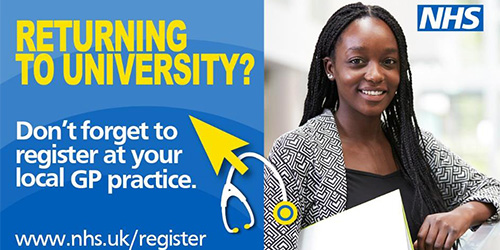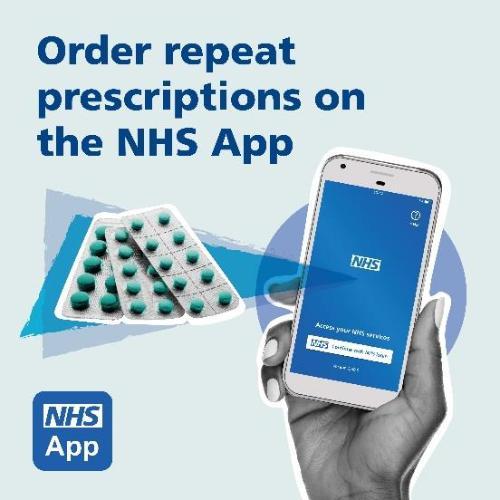Advice for new student from the NHS

It's important to look after your health when living away from home. This includes registering with a local GP and dentist, getting up to date with your vaccines and finding your local sexual health service. See advice below for international students.
Here are our top health tips for new students.
1. Register with a local GP and get the NHS app
If, like most students, you spend more weeks of the year at your university address than your home address, you need to register with a GP near your university as soon as possible. That way you can receive care if you need it, and access health services quickly and easily while you're away.
This is especially important if you have an ongoing health condition, particularly one that needs medicine, such as asthma, diabetes or epilepsy.
You can choose to register with any local GP. The health centre attached to your university is likely to be the most convenient, and the doctors working there will be experienced in the health needs of students.
Find your local GP surgery
How to register with a GP surgery
If you have an urgent care need, use NHS111 first. This service can be found online https://111.nhs.uk; on the NHSApp; or by calling 111.
Download the NHS app 
The NHSApp is owned and run by the NHS. It is a simple way to access a range of NHS services on your smartphone or tablet.
Download the app now from www.nhs.uk/nhs-app.
Other health services available
Many university health centres have good links with specialists, such as psychiatrists, sports physicians, psychotherapists, counsellors and physiotherapists.
Having trouble getting an appointment? You can also always ask your local pharmacist for medical advice and support.
They may not be at the pharmacy counter when you go in, so ask the person at the counter if you can speak to the pharmacist. There will be a separate room so you can have a conversation privately if you wish.
Getting ill during the holidays
If you become unwell or need other medical treatment when you're at home or not staying near your university GP, you can contact your nearest practice to ask for treatment.
You can receive emergency treatment for 14 days. After that you will have to register as a temporary resident or permanent patient.
2. Register for dental care
If you need dental care while you are at university, for check-ups or to treat a problem, you can see details of local dentists at Find a dentist - NHS (www.nhs.uk).
Not all dentists offer NHS work and not all NHS work is completely free. But you may be able to apply for help with health costs including prescriptions and dental care.
3. Check your vaccinations
MenACWY vaccination to protect against meningitis
Students can have a vaccination to prevent meningitis and other diseases.
The MenACWY vaccine protects against 4 different causes of meningitis and septicaemia: meningococcal (Men) A, C, W and Y diseases.
All 17- and 18-year-olds in school year 13 and first-time university students up to the age of 25 are eligible as part of the NHS vaccination programme.
GP practices will automatically send letters inviting 17- and 18-year-olds in school year 13 to have the MenACWY vaccine.
But if you're a student going away to university or college for the first time, contact the GP you're registered with to ask for the MenACWY vaccine, ideally before the start of the academic year.
This is because you'll be at particularly high risk in the first weeks of term, when you're likely to come into contact with many new people.
Measles, Mumps and Rubella (MMR) vaccination
This year there has been an increased number of measles cases in England, and it is really important that you are fully protected against this illness which can be very serious.
The MMR vaccine is part of the routine NHS childhood immunisation schedule. This means most young people who've grown up in England will have had 2 doses of it in childhood.
If you're not sure you've had two doses of the MMR vaccination, ask a GP for a catch-up vaccination.
Flu jab
Get an annual flu vaccination if you have asthma and take inhaled steroids. You should also get a flu vaccination if you have a serious long-term condition such as kidney disease.
HPV vaccination
Nearly all cervical cancers are caused by the Human Papillomavirus virus group (HPV), as well as some mouth and throat cancers and some cancers of the anus and genital areas.
By having the HPV vaccination, you are protecting yourself and others. HPV vaccination is available to women up to the age of 25 and also to eligible GBMSM.
4. Community pharmacy services
Community pharmacies are your local retail pharmacies, who now offer a range of services for you to access.
Although they are better known for dispensing your prescription medicines and over-the-counter medicines, their role is much broader and includes services for conditions such as urinary tract infections (UTIs) and providing an ongoing supply of contraception.
Find a pharmacy who offers extended care services
5. Sexual wellbeing
Even if you do not plan to be sexually active while studying, it's good to be prepared.
Contraception and condoms are free for everyone from any GP – it does not have to be your own – or family planning clinic. You also have the option of visiting your local pharmacy for repeat contraception after your initial consultation and prescription from your GP.
Getting tested and treated for sexually transmitted infections (STIs) is straightforward and confidential. Most infections can be cured.
Find your local sexual health service
6. Rest and healthy food
You'll greatly increase your chances of keeping healthy by taking care of yourself.
Student life may not be renowned for early nights and healthy eating, but getting enough sleep and eating well will mean you have a better chance of staying healthy.
You'll feel more energetic and be better equipped to cope with studying and exams.
Remember to:
- eat 5 portions of fruit and vegetables a day
- buy wholemeal bread and pasta instead of white
- avoid eating fast food and takeaways.
Eating well does not have to cost a lot and is often cheaper than takeaways. Taking the time to cook simple meals instead of eating out or buying ready meals is also healthier.
Read more about eating well for less.
7. Drinking and smoking
It's recommended to drink no more than 14 units of alcohol a week, spread across three days or more. That's around six medium (175ml) glasses of wine, or six pints of 4% beer.
There's no completely safe level of drinking but sticking within these guidelines lowers your risk of harming your health. Try using Alcohol Change UK's unit calculator to work out how many units you drink and watch our video guide to alcohol units.
Stopping smoking is one of the best things you will ever do for your health. Quitting is much easier when you get the right support and there are lots of options to choose from.
Check out advice, tools and tips to stop.
8. Disabled Students' Allowance (DSA)
As a higher education student living in England, you can apply for a Disabled Students' Allowance (DSA) if you have a:
- disability
- long-term health condition
- mental health condition
- specific learning difficulty, such as dyslexia.
The support you get depends on your individual needs and not on income.
Advice for International students
1. GP registration for international students
As an international student residing in the UK, you’re allowed to register with a GP Surgery or Health Centre to access NHS healthcare.
The GP registration process is exactly the same as for those who are UK students. The only difference is that you may be required to provide additional documentation to prove that you are a student in the UK, including your passport or immigration documents.
2. What documents do you need?
Although you don’t need to provide specific documentation when registering with a GP, you may need certain information to complete the registration form, like your passport or biometric residence permit (BRP) number.
Once registered, your GP may request your medical or vaccination records for reference. As an international student, keep this in mind in case you need to bring certain medical documents from home.
Your GP Surgery may also request proof of address just to ensure you live in the surgery’s area (known as their ‘practice boundary’).
3. How to choose the right GP for you
Making sure you feel comfortable with your GP is a really important part of getting quality healthcare as a student.
If you’re not sure where to register, try talking to residents in your area and seeing who they recommend. Alternatively, you can take a look at reviews of local GP Surgeries and Health Centres online to get a feel for what GP may be right for you.
4. How to get an appointment
GP appointments may be in-person, over the phone or online.
When booking an appointment, you have a couple of options. You could book online by filling out a form, give them a call to organise an appointment or visit the surgery to make one. Your GP may have a preferred method so make sure to check with them.
Your GP may request some information about what the appointment is for. This is to help them decide how soon you need to be seen and by what type of medical professional.
You also have the option of downloading the NHS app and creating an online account which will allow you to book appointments via the app or directly on the website.
5. Emergencies
You may be able to get an emergency appointment by calling your GP, however, this will depend on their out-of-hours availability.
If you aren't able to wait for a GP appointment, call NHS 111 for advice. If you are experiencing a life or limb-threatening emergency, call 999 or visit the A&E (accident and emergency).
6. FAQs about GP registration as a student in the UK
How do I change GP?
There may be a couple of reasons why you want to change your GP. You may have moved or just not like your current GP. If you want to change your GP, you can register with a new GP, and your medical records will be transferred. This could take up to 28 days.
How do I change NHS address?
If your address changes, there may be a risk you miss important communication from the NHS. If you change your address but live in the same area, you may be able to stay at the same GP - check with your GP Surgery. On the other hand, if you’ve moved outside of the area, you will need to register with a new GP.
Can you be registered with two GPs?
No, you can’t be registered with two GPs at the same time. You may be able to register with a temporary GP if you’re working or studying and can’t access your local GP.
For more information please contact the Corporate Communications Team.


/prod01/wlvacuk/media/departments/digital-content-and-communications/images-2024/Diane-Spencer-(Teaser-image).jpg)
/prod01/wlvacuk/media/departments/digital-content-and-communications/images-18-19/220325-Engineers_teach_thumbail.jpg)
/prod01/wlvacuk/media/departments/digital-content-and-communications/images-2024/241024-Dr-Christopher-Stone-Resized.jpg)
/prod01/wlvacuk/media/departments/digital-content-and-communications/images-2024/UoW-City-Campus-(Teaser-Image).jpg)
/prod01/wlvacuk/media/departments/digital-content-and-communications/images-2024/241014-Cyber4ME-Project-Resized.jpg)
/prod01/wlvacuk/media/departments/digital-content-and-communications/images-2024/240315-Research-Resized.jpg)
/prod01/wlvacuk/media/departments/digital-content-and-communications/images-2024/WMCA-event-(teaser).jpg)